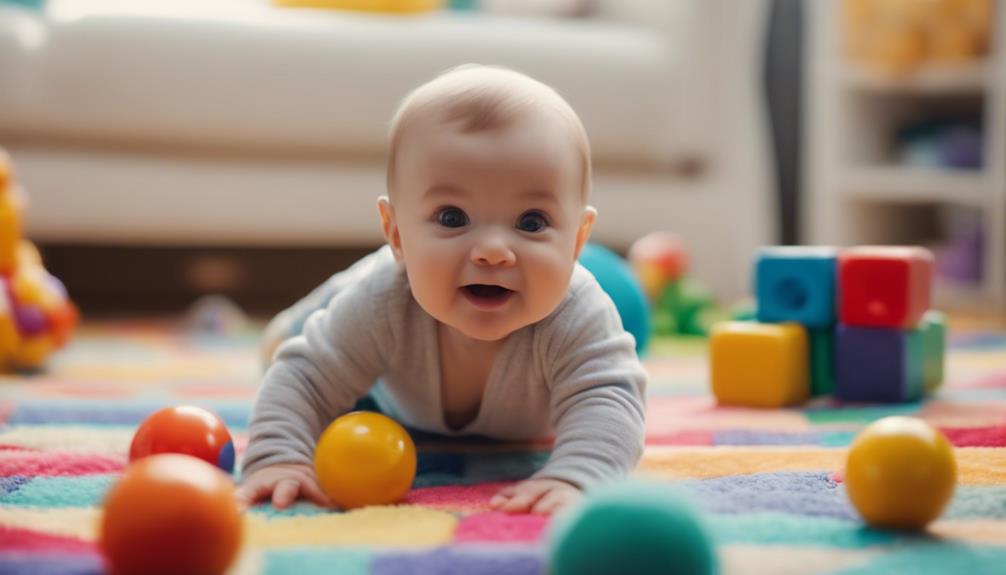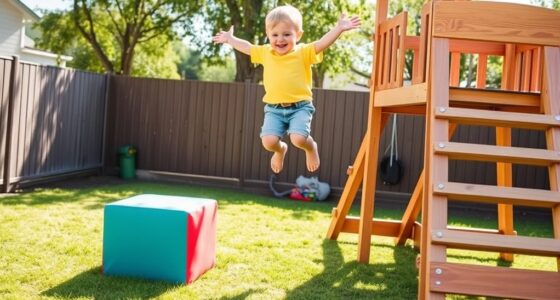Encouraging babies to move is crucial for their development. Consider incorporating tummy time to help strengthen muscles and promote sensory growth. Play is vital for building bonds and enhancing skills. Utilize toys such as rattles and play gyms to encourage reaching and kicking. Floor play helps with balance and coordination. Gradually support babies in sitting and standing in a secure environment. Offer toys within their reach to improve fine motor skills. Engage babies in various activities to foster overall physical growth. Remember, every movement plays a role in your baby’s journey towards reaching important milestones and achieving healthy development.
Key Takeaways
- Engage in tummy time to strengthen muscles and promote movement.
- Provide toys within reach to encourage reaching and grasping.
- Support sitting and standing efforts with gradual assistance.
- Create safe and stimulating environments for active exploration.
- Use toys that enhance balance, coordination, and motor skills.
Benefits of Tummy Time
By incorporating tummy time into your baby's daily routine, you can help strengthen their neck, head, and upper body muscles essential for motor skills development. Tummy time is recommended for infants and toddlers 2-3 times a day, aiding in their physical development.
This practice not only reduces the risk of flat head syndrome but also enhances important motor skills such as rolling, crawling, and sitting. Engaging in tummy time activities provides babies with enriched visual and sensory experiences, stimulating their overall development.
Creating a safe and comfortable tummy time environment encourages infants to explore and build the necessary muscles for motor skill proficiency. Through regular tummy time sessions, your baby can improve their coordination, balance, and strength, setting a strong foundation for their physical capabilities as they grow.
Importance of Play for Babies
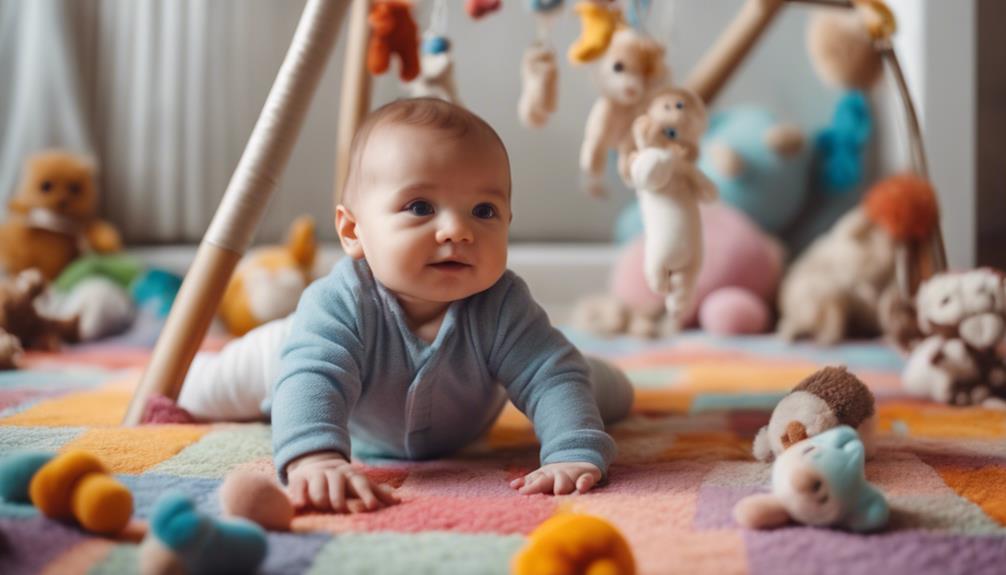
Incorporating play into your baby's daily routine is vital for strengthening muscles, promoting movement, and enhancing motor skills development. Encouraging movement through play helps babies strengthen their neck and upper body muscles, supporting important abilities like head control and rolling. Bonding with your baby during play enhances physical skill development and overall well-being. By providing praise and encouragement during play, you can motivate your baby to engage in movement activities and reach developmental milestones. Play ideas such as tummy time, reaching for toys, and engaging in face-to-face interactions can help your baby develop essential motor skills and coordination.
| Play Ideas | Benefits | Age Range |
|---|---|---|
| Tummy Time | Strengthens neck and upper body muscles | 0-6 months |
| Reaching for Toys | Improves reaching and grasping skills | 3-9 months |
| Face Time | Enhances social interaction and visual development | 0-12 months |
Toys for Motor Skill Development
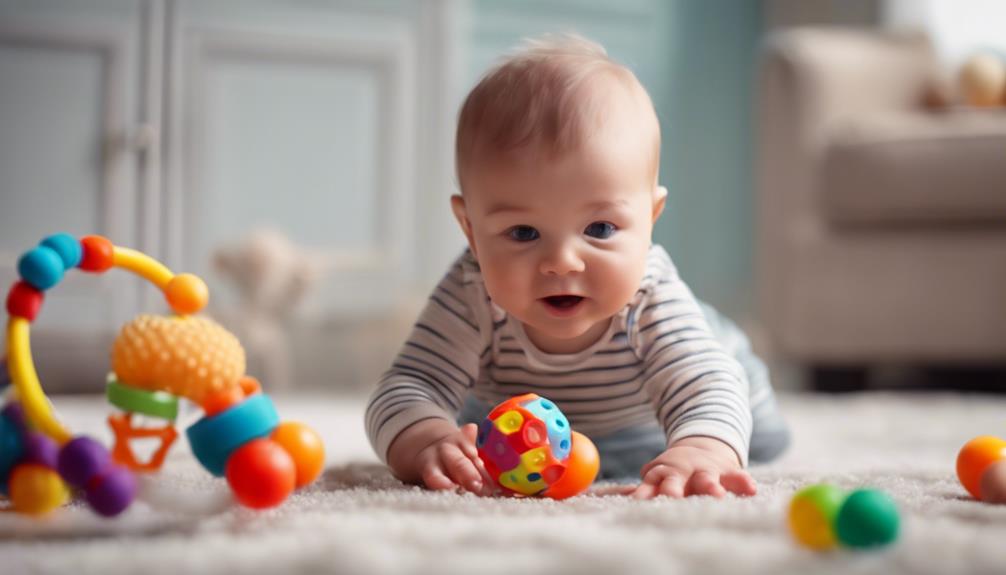
Toys play a crucial role in enhancing your baby's motor skill development. Choosing the right toys can help your little one improve their motor skills through play.
Rattles, soft blocks, and textured balls are excellent for developing reaching and grasping abilities. Play gyms with hanging toys encourage babies to reach, kick, and bat at objects, promoting motor skills.
Push-and-pull toys, like wagons or toy cars, aid in strengthening muscles and balance, essential for standing and walking. Stacking rings or cups can enhance hand-eye coordination and fine motor skills during playtime.
Interactive toys with sounds and lights engage babies in movement activities, stimulating sensory development alongside motor skills. By incorporating a variety of toys that focus on different aspects of motor skill development, you can provide your baby with a fun and engaging way to enhance their physical abilities.
Floor Play Sessions for Babies

Engage in daily floor play sessions to help your baby develop essential motor skills like rolling, reaching, and sitting.
These sessions provide a safe and stimulating environment that enhances sensory development and encourages active engagement with colorful toys.
Supervised floor play supports your infant in building balance, coordination, and strength, laying a strong foundation for physical development.
Tummy Time Benefits
During floor play sessions for babies, engaging in tummy time offers significant benefits for their physical development. Tummy time aids in strengthening the muscles in an infant's neck, head, and upper body, laying the foundation for essential motor skills.
Here are three key advantages of incorporating tummy time into your baby's routine:
- Enhanced Muscle Development: Tummy time encourages your baby to lift their head and maintain it upright, promoting the growth of core muscles important for crawling and eventually walking.
- Improved Reaching and Grasping Skills: Placing toys strategically just out of reach during tummy time sessions stimulates your baby's curiosity, motivating them to reach and grasp for objects, fostering fine motor skill development.
- Sensory Stimulation: Engaging with your baby through singing and talking during tummy time not only strengthens your bond but also supports their sensory development, aiding in their cognitive growth and emotional well-being.
Incorporating tummy time regularly into your baby's routine is essential for their overall physical and cognitive development.
Sensory Play Importance
Exploring their environment through touch, sight, and sound, sensory play is essential for babies during floor play sessions. Engaging in sensory activities not only stimulates their senses but also promotes cognitive development by encouraging curiosity and exploration. During these sessions, babies have the opportunity to improve their fine motor skills as they grasp, touch, and manipulate various objects. This hands-on experience helps them learn cause and effect, develop spatial awareness, and understand object permanence. Sensory play also aids in the development of important sensory processing skills crucial for overall growth and learning.
| Benefits of Sensory Play during Floor Sessions |
|---|
| Stimulates the senses |
| Promotes cognitive development |
| Improves fine motor skills |
| Enhances learning of cause and effect |
Motor Skill Development
Developing motor skills is essential for babies during floor play sessions as they learn to reach, grasp, and roll, fostering physical growth and exploration. Engaging in these activities not only aids in their physical development but also allows them to actively explore their surroundings.
Here are three key points to keep in mind during floor play sessions:
- Encouraging Physical Activity: Floor play sessions provide a safe space for babies to engage in physical movements like reaching for toys or rolling over, promoting muscle development and coordination.
- Strategic Placement to Encourage Reach: Placing toys within a baby's reach during floor play encourages them to extend their arms and explore, enhancing their motor skills and spatial awareness.
- Supporting Overall Development: Through regular floor play sessions, babies can improve their balance, coordination, and sensory skills, laying a strong foundation for future physical milestones.
Supporting Sitting and Standing

To assist your baby in learning to sit and stand, provide support gradually while ensuring a safe environment free of hazards. Supporting your baby's sitting development can be done by placing them between your legs with your hands ready for balance, gradually reducing the amount of support given.
Encouraging standing can involve using stable furniture or holding your baby's hands as they practice this skill. It's important to offer safe toys or objects for your baby to hold onto while they explore sitting and standing.
Additionally, using cushions or pillows can create a soft landing spot in case your baby loses balance. Remember to always maintain a safe environment by removing any sharp edges or hazardous objects when engaging in these activities.
Early intervention in supporting your baby's sitting and standing milestones is vital in their overall motor skill development and can be a rewarding part of your childcare routine.
Creating a Stimulating Environment
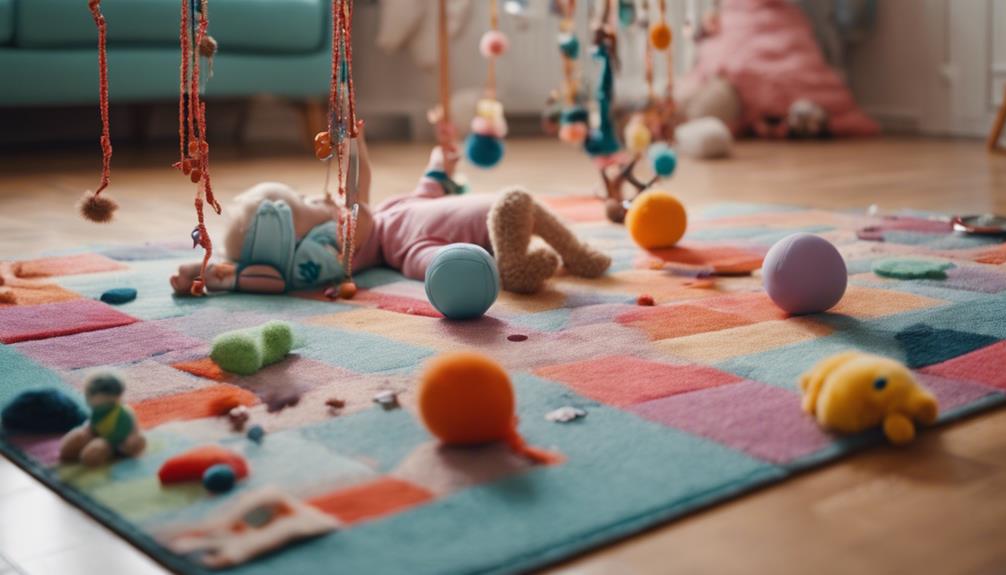
Providing a stimulating environment for infants is essential for their overall development and growth. To create an environment that encourages movement and exploration, consider the following:
- Engage in Floor Play:
Incorporating daily floor play sessions can aid in developing your baby's motor skills and coordination. Utilize colorful toys and objects to capture their attention and stimulate their senses.
- Offer Safe Toys for Exploration:
Providing safe toys and objects for your infant to interact with can encourage curiosity and exploration. Make sure that these items are age-appropriate and free from small parts that could pose a choking hazard.
- Support Sitting and Standing Efforts:
By offering assistance during your baby's sitting and standing endeavors, you can help them enhance their balance and motor skills. Encourage these movements in a safe and supervised manner to promote healthy physical development.
Creating a sensory-rich environment not only fosters cognitive and motor skill development but also establishes a safe and engaging space for your little one to thrive.
Encouraging Reaching and Grasping
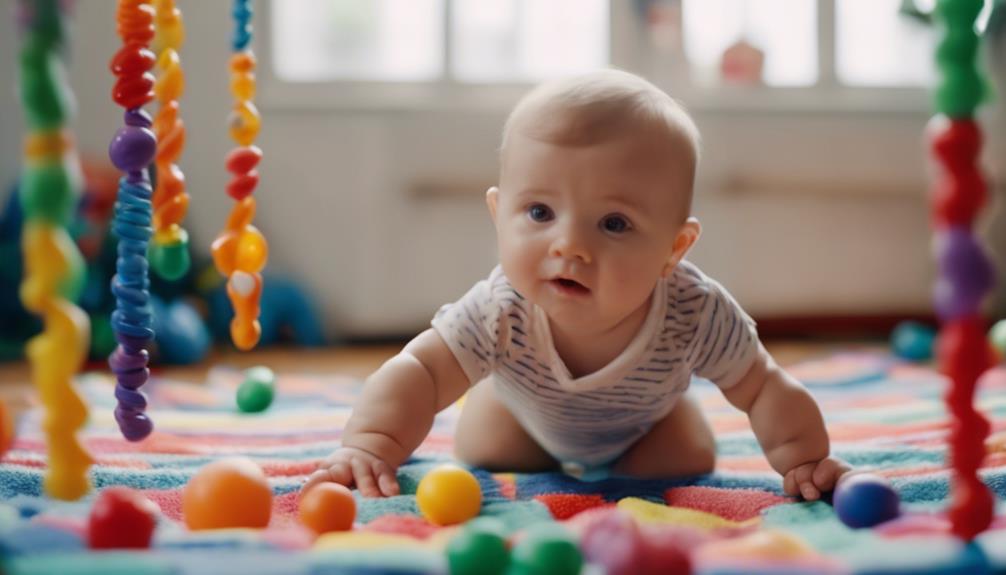
Encourage your baby's reaching and grasping skills by strategically placing toys within their reach during playtime. Providing safe and age-appropriate toys that are easy to grasp can support the development of fine motor skills in infants.
Engaging in interactive play by holding objects for your baby to reach and grasp not only fosters hand-eye coordination but also promotes active participation in play. By placing toys just out of your baby's reach, you can promote reaching and grasping movements, encouraging your little one to stretch and grab for the objects.
Repeated practice of reaching and grasping activities is essential as it helps strengthen hand muscles and improve coordination in infants. These interactive play sessions not only aid in physical development but also enhance cognitive skills as your baby learns cause and effect through reaching and grasping different objects.
Remember to always supervise your baby during playtime to guarantee a safe and enjoyable learning experience.
Movement Activities for Infants
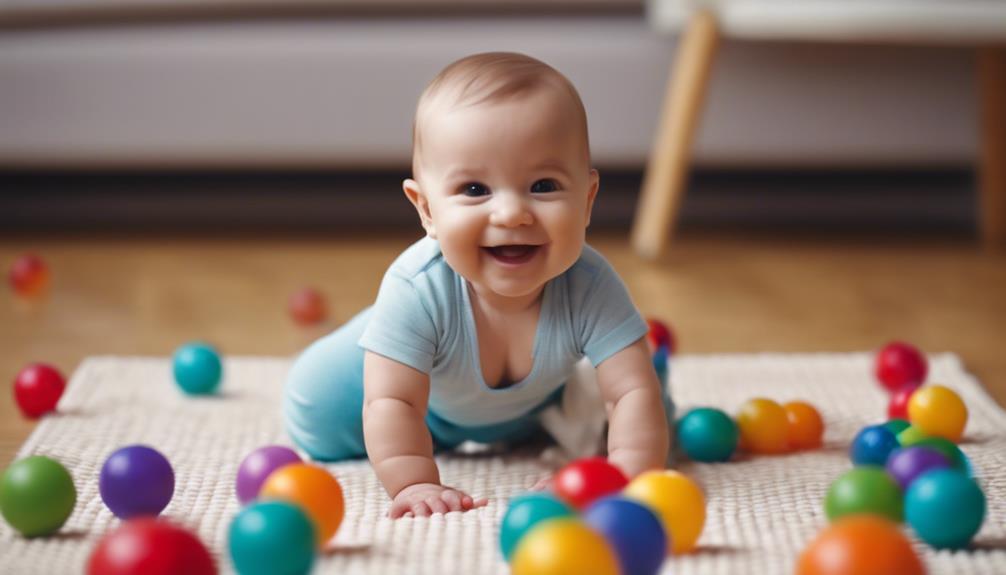
Engage your infant in movement activities to promote physical development and motor skills. Here are some tips to help your little one thrive:
- Incorporate minutes of tummy time:
Encourage your baby to spend short periods on their tummy daily. This helps strengthen their neck, back, and shoulder muscles, preparing them for important milestones like rolling over and crawling.
- Encourage play for short periods:
Keep play sessions brief but frequent to prevent your baby from getting overtired. Placing toys within reach can motivate them to practice reaching and grasping skills, enhancing their hand-eye coordination.
- Support sitting activities:
Assist your baby in sitting upright, providing stability and balance. This position allows them to explore their surroundings and develop core strength, which is essential for sitting independently and eventually standing.
Developing Baby's Motor Skills
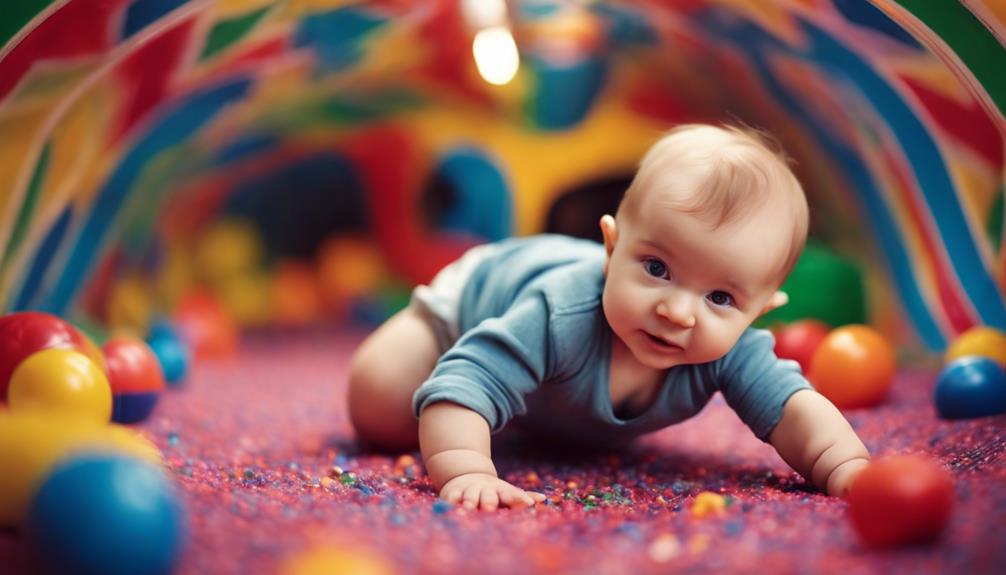
To enhance your baby's motor skills, focus on creating a stimulating environment that encourages movement and exploration. Engaging in activities like tummy time is essential for developing neck, head, and upper body strength. Place toys within your baby's reach to encourage reaching and grasping, which are fundamental for motor skill development.
Daily floor play sessions are recommended by guidelines to promote movement, balance, and sensory development. Support your baby's efforts to sit and stand, as these actions also contribute to enhancing motor skills.
Milestones in Physical Development

As infants grow and develop, they typically reach significant milestones in their physical development between the ages of 3 to 9 months. These milestones play an important role in laying the foundation for future movement abilities.
Here are three key milestones to look out for during this period:
- Head Control: By around 3 to 4 months, infants start to demonstrate improved head control, allowing them to hold their heads steady when upright or on their tummy. This milestone is essential for developing neck and upper body strength.
- Rolling: Between 4 to 6 months, many infants begin to roll over from their back to their stomach and vice versa. Rolling is a significant milestone as it signifies improved coordination and core strength necessary for more complex movements.
- Sitting: Around 6 to 9 months, infants may start to sit independently without support. Sitting independently marks a milestone in balance and postural control, setting the stage for further exploration and interaction with their surroundings.
Frequently Asked Questions
What Activities Encourage Physical Development in Infants?
To encourage physical development in infants, engage in tummy time for muscle strength, place toys within reach for movement skills, support sitting for balance, provide a safe exploration space, and play with colorful toys for sensory development.
How to Encourage a Baby to Be More Active?
To encourage your little one to be more active, try incorporating playful interactions throughout the day. Engage them during tummy time, hold toys at eye level, offer safe toys for reaching, chat with them, and guarantee safe sleeping positions.
How to Encourage a Baby to Push Up?
To help your baby push up, place toys just out of reach during tummy time. Use colorful toys and praise their efforts. Gradually increase tummy time duration. Encourage them to build neck and upper body strength.
What Type of Physical Activity Is Recommended for Infants?
To support your infant's development, engage in activities like tummy time, rolling, and reaching for toys. Encourage movement and play to enhance motor skills and sensory development. Create a safe, stimulating environment for exploration and growth.
Conclusion
To sum up, keep in mind that encouraging your baby's movement is essential for their overall development. From tummy time to play sessions and reaching and grasping activities, every little movement counts towards building their motor skills.
So, don't hesitate to get down on the floor and engage with your little one in fun and interactive ways. Your active involvement won't only support their physical growth but also create lasting bonds and memories.
So, let the playtime begin – the world is your baby's oyster!

